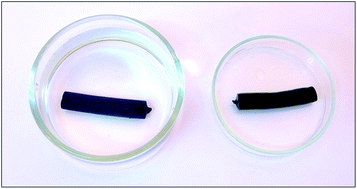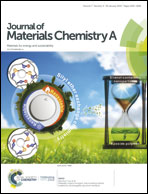Carbogels: carbonized conducting polyaniline/poly(vinyl alcohol) aerogels derived from cryogels for electrochemical capacitors
Abstract
Polyaniline cryogels supported with poly(vinyl alcohol) represent soft conducting macroporous materials suitable for conversion to aerogels by freeze-drying and, subsequently, to nitrogen-containing carbogels by carbonization in an inert atmosphere at 500–600 °C. The process was followed by thermogravimetric analysis and Raman spectroscopy at the molecular level. The spectral features indicate a significant degree of structural disorder in the material due to the extensive nitrogen and oxygen incorporation into the carbon sp2 network, which is important for the improvement of capacitive performance. The macroporous morphology is preserved after carbonization but the specific surface area increased from 12 to 680 m2 g−1 after exposure to 500 °C in an inert atmosphere. The original conductivity of the cryogel swollen with an acid solution, 0.07 S cm−1, was reduced to 2 × 10−4 S cm−1 for the aerogel and again to 10−9 S cm−1 as the carbonization progressed. The impedance spectra display Maxwell–Wagner–Sillars relaxation typical of heterogeneous composite systems with the contribution of ionic conductivity. The decrease in conductivity is in agreement with the significant drop in the static dielectric constant observed by broad-band dielectric spectroscopy and decrease in the spin number determined by electron paramagnetic resonance spectroscopy. Switching in the capacitive response from that dominated by faradaic surface processes at lower treatment temperatures to that of double-layer charging at elevated temperatures is evidenced, while the correlation between surface spin density and specific capacitance is emphasized. The results can be used as guidance for the rational design of novel active materials for electrochemical capacitors.



 Please wait while we load your content...
Please wait while we load your content...